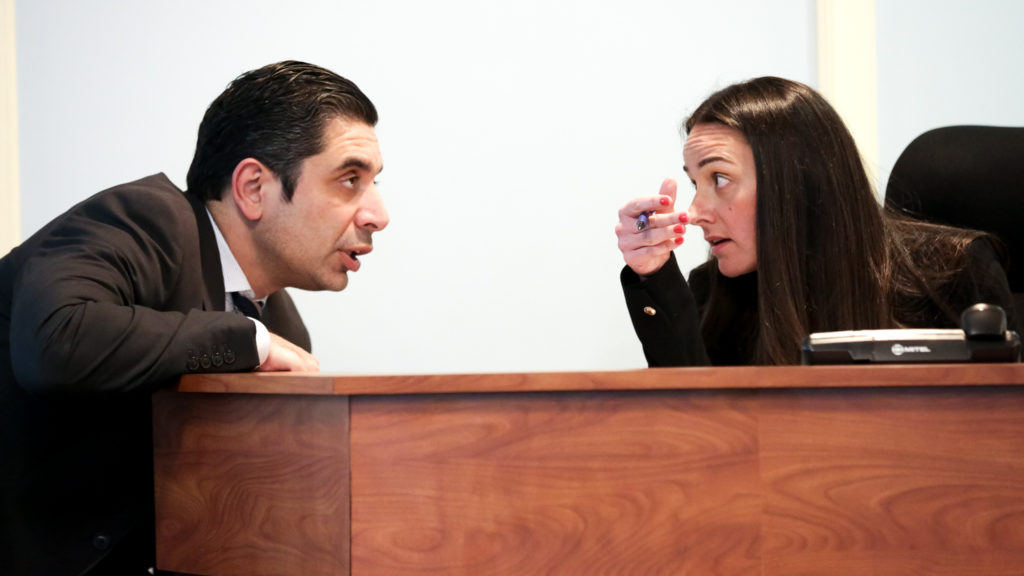Questions Swirl Over $36 Million KB Budget Vote
Tony WintonSeptember 9, 2019

Public Works Director Jake Ozyman speaks with Key Biscayne Village Manager Andrea Agha during a Village Council meeting, Aug. 27. 2019. The Council is set to conduct its first vote on the 2020 budget. (Key News/Tony Winton)
UPDATE 9/11
Resiliency issues dominated debate Tuesday as the Village Council tentatively adopted a $36 million budget for 2020. The revised spending plan restores $1 million in funding for an expansion of the Community Center and adds $600,000 in funding for beach renourishment. Council members decided to delay purchase of a parking lot near Village Hall, but the panel tentatively approved a plan to purchase two pocket parks on Harbor Drive.
Taxes would be essentially unchanged. The vote was 6-1.
Also by a 6-1 vote, council members decided to nearly double stormwater fees to begin the first phase of upgrading pumps and drains at a cost of $17 million.
The council deferred final passage of a transfer of $2 million to the retirement system covering police and fire personnel. No explanation was given for the deferral.
Tuesday’s vote is the first in a two-step process and was somewhat tentative in nature. Several council members said they wanted to make additional changes.
The final budget vote is Sept. 24. Look for full coverage of the budget and related issues in Monday’s edition of Key News.
With millions of dollars of costs unknown, Key Biscayne’s Village Council is scheduled to take its first vote Tuesday on a $36 million budget for 2020, the first spending plan drafted by Village Manager Andrea Agha.
The plan essentially keeps taxes and spending at current levels and postpones major environmental resiliency projects until at least 2021.
Mayor Mike Davey has said he wants to schedule a bond referendum for the November 2020 ballot, and there have been growing calls to remove the Village’s borrowing cap to deal with sea level rise and other environmental challenges. But no concrete proposals have materialized so far.
“Our budget needs work,” Davey said at the Aug. 27 council meeting, noting 10 months had passed without enough movement on major problems.
“It is unclear, to me, what opportunities and challenges we will face when it comes to our own capital improvement plan,” he said.
More than $100 million in various projects were identified in a May strategic planning session, but few of them have made it into the coming year’s plan.
Several financial issues could prove contentious Tuesday. In June, the council split 4-3 on what amounted to a test vote on taxes. Officials indicated a preference to keep the budget in a revenue-neutral posture by adjusting the millage rate to keep collections the same as in 2019.
Even with many projects deferred in the 2020 budget, there are several unresolved questions:
- Whether the council will agree with Agha’s recommendation to double stormwater fees to start $17 million in new pumps, drains and other improvements. The amount is about half of the overall plan, but calls for an accelerated timeline.
- Whether the council will put $2 million into the retirement system covering police and fire personnel over concerns the pension is underfunded. At least one council member, Ed London, says he will oppose the transfer ordered in 2018. At the same time, a critical report from the pension actuary has still not been delivered. The document is necessary to determine pension funding.
- Whether the council will approve about a half-million dollars for studies and surveys for the 2040 Vision Committee and utility undergrounding.
- Whether the Village funds a Chief Resilience Officer for $170,000 yearly.
Budget discussions are rarely free of conflict in any town, but this year’s process has been marked by sometimes emotional disputes over how some cherished Village programs are administered.
Community Groups
The proposed budget fully funds community groups at prior levels and contemplates a contract with the Key Biscayne Community Foundation. Although a contract proposal was approved by the council, the document hasn’t yet been signed by the charity. The Community Foundation is also expected to continue administration of the Freebee transit service, although revenues and disbursements will be handled by the Village.
Staffing Levels, Raises
Agha’s budget proposes a decrease of two full-time staff positions and envisions 128 full-time employees, 52 part-time workers and 10 seasonal employees. The Village earlier outsourced code enforcement staff and that is expected to continue.
Council Member London said the staff reduction is too modest for his liking and he would like to see cuts in police and fire department staffing. “The number of non-sworn police department staff are excessive,” he said.
Village employees will receive raises of 2.2% under union contracts, but staffing levels, pensions and other labor issues will come up later this year when collective bargaining talks begin for agreements expiring a year from now. The Village is conducting a compensation study and union officials have said privately they are expecting tough bargaining with Agha’s administration.
Capital Projects
The proposal calls for about $7 million in capital projects under Agha’s new definition, ranging from $1 million for new vehicles, including a new fire truck; $1.2 million for a long-delayed park at 530 Crandon Boulevard; $1.5 million for Village Hall parking; and $1.1 million for Safe Routes to School construction.
Absent from the capital budget is funding for a further expansion of the Key Biscayne Community Center sought by the previous Council to address overcrowded facilities. An architect was hired in 2018 to study an expansion of 25%, which would create a larger gym, a bigger pool, and other changes. A preliminary projected cost was $7.4 million.
Revenue and Accounting Changes
Agha’s budget also includes a number of accounting changes that make comparisons to prior years difficult, and that applies to new revenue projections as well. The budget was assembled with an expanded finance staff that has been analyzing Village spending and income.
Even with a larger finance team, however, Agha is pressing for a $367,000 software package she says is critical for better planning. Mayor Davey postponed the matter until Tuesday’s meeting, questioning why Agha did not review other systems.
There are dozens of accounting changes. For example, the draft budget makes a change in the way $575,000 in state retirement rebates, called 175/185 rebates, are stated. The accounting change caused a budget line for “other income” to swell to $612,000, but in fact, the money can only be spent on retirement plans under state law, and so it is not available for other uses.
The Village is also trying to increase revenue by shoring up fines and fees, including those collected from red light cameras and building permit programs. In her memo to Council, Agha said permit fees “were not being implemented properly” and that corrections could lead to revenue increases.
Another change includes how the capital budget is presented. Agha has redefined capital projects to include any long-term spending over $100,000, while previous budgets used a $10,000 standard. A capital surplus of $8.2 million a year ago shrank to just $4.2 million in September, even though capital spending slowed to $1.4 million through June 30.
In her memo to Council, Agha said she was working on an “apples to apples comparison” that would be provided by the second budget hearing Sept. 24.
Transparency Questions
Agha, who has just completed her first year as Key Biscayne’s chief executive, is trying to regain her footing after acknowledging the August budget proposal fell short of her own expectations.
She has chosen to conduct closed-door sessions with individual council members to answer questions, some of them occurring as late as Monday. Some queries about specific spending matters have gone unanswered. A public records request to Agha — made over a month ago — for departmental submissions has not been responded to.
Even council members seemingly have been left out of the information loop at times. Council Member Luis Lauredo said during the Aug. 27 meeting that he was surprised by a discussion on the $2 million pension funding item. He said Agha had earlier told him the matter was being deferred.
Some questions were to be answered at a hastily-called budget workshop Sept. 3, but the session was canceled because of Hurricane Dorian.
Despite the added financial staff, the pacing of the budget process and public access to it is well behind the last budget cycle and trails that of other municipalities, many of which held workshops in July.


